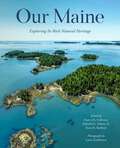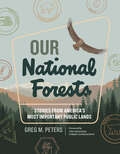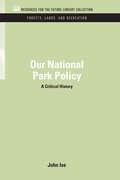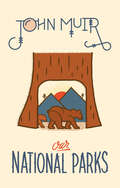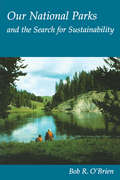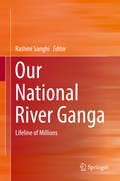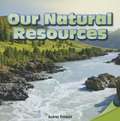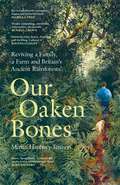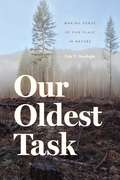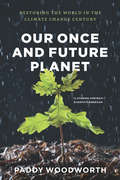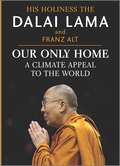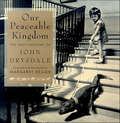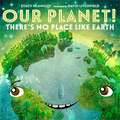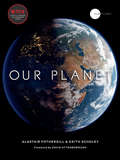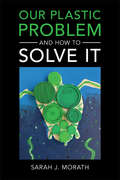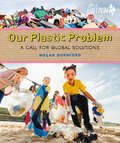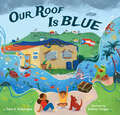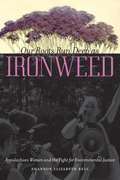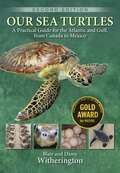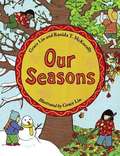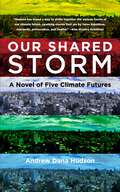- Table View
- List View
Our Maine: Exploring Its Rich Natural Heritage
by Aram Calhoun Malcolm Hunter Jr. Kent RedfordLobsters, blueberries, moose, and rugged coastlines dotted with lighthouses are emblematic of the state of Maine. But underlying these simple icons is the rich natural heritage of Maine that drives the economy and shapes the state's culture. The history of Maine&’s natural heritage has been co-produced by the both the natural and human worlds. The essays and photographs gathered here paint a vivid portrait of Maine's wild places and wild creatures, as well as of human impacts and the way the state's heritage has changed.
Our National Forests: Stories from America's Most Important Public Lands
by Greg M. PetersStories from America&’s Most Important Public Lands Across 193 million acres of forests, mountains, deserts, watersheds, and grasslands, national forests provide a multitude of uses as diverse as America itself. Welcoming 170 million visitors each year to hike, bike, paddle, ski, fish, and hunt, &“the people&’s lands&” offer more than just recreation. Timber is harvested, lost habitats are recovered, and endangered wildlife is protected as part of the Forest Service&’s enduring mission. In Our National Forests, Greg Peters reveals an inside look at America&’s most important public land and the people committed to protecting it and ensuring access for all. From the story of how the Forest Service grows millions of seedlings in the West each year, to their efforts to save the hellbender salamander in Appalachia, the narrative spans the breadth of the country and its diverse ecology. People are at the center of the stories, whether the dedicated folks in the Forest Service, or the everyday citizens who support and tend to the protected lands near their homes. This complete look at America&’s National Forests—their triumphs, challenges, controversies, and vital programs—is a must-read for everyone interested in the history of America's most important public lands.
Our National Park Policy: A Critical History (RFF Forests, Lands, and Recreation Set)
by John IsneA legislative and administrative history on the social, cultural, and intellectual significance of the national park idea. Originally published in 1961
Our National Parks
by John MuirFor every person who has experienced the beauty of the mountains and felt humbled by comparison.John Muir’s Our National Parks—reissued to encourage, and inspire travelers, campers, and contemporary naturalists—is as profound for readers today as it was in 1901.Take in John Muir’s detailed observations of the sights, scents, sounds, and textures of Yosemite, Yellowstone, and forest reservations of the West. Be reminded (as Muir sagely puts), “Wildness is a necessity; and that mountain parks and reservations are useful not only as fountains of timber and irrigating rivers, but as fountains of life.”John Muir’s warmth, humor, and passionate advocacy for these public lands is enough to spur any reader on to plan a National Parks adventure of their own.
Our National Parks and the Search for Sustainability
by Bob R. O'BrienYosemite Valley in July of 1967 would have had to be seen to be believed. There was never an empty campsite in the valley; you had to create a space for yourself in a sea of cars, tents, and humanity. . . . The camp next to ours had fifty people in it, with rugs hung between the trees, incense burning, and a stereo set going full volume. Scenes such as this will probably never be repeated in Yosemite or any other national park, yet the urgent problem remains of balancing the public’s desire to visit the parks with the parks’ need to be protected from too many people and cars and too much development. In this book, longtime park visitor and professional geographer Bob O’Brien explores the National Park Service’s attempt to achieve "sustainability"—a balance that allows as many people as possible to visit a park that is kept in as natural a state as possible. O’Brien details methods the NPS has used to walk the line between those who would preserve vast tracts of land for "no use" and those who would tap the Yellowstone geysers to generate electricity. His case studies of six western "crown jewel" parks show how rangers and other NPS employees are coping with issues that impact these cherished public landscapes, including visitation, development, and recreational use.
Our National Parks and the Search for Sustainability
by Bob R. O'BrienA study of the US National Park Service&’s efforts to allow for as many visitors as possible in the parks that are kept in as natural a state as possible.&“Yosemite Valley in July of 1967 would have had to be seen to be believed. There was never an empty campsite in the valley; you had to create a space for yourself in a sea of cars, tents, and humanity. . . . The camp next to ours had fifty people in it, with rugs hung between the trees, incense burning, and a stereo set going full volume.&”Scenes such as this will probably never be repeated in Yosemite or any other national park, yet the urgent problem remains of balancing the public's desire to visit the parks with the parks&’ need to be protected from too many people and cars and too much development. In this book, longtime park visitor and professional geographer Bob O&’Brien explores the National Park Service&’s attempt to achieve &“sustainability,&” a balance that allows as many people as possible to visit a park that is kept in as natural a state as possible.O&’Brien details methods the NPS has used to walk the line between those who would preserve vast tracts of land for &“no use&” and those who would tap the Yellowstone geysers to generate electricity. His case studies of six western &“crown jewel&” parks show how rangers and other NPS employees are coping with issues that impact these cherished public landscapes, including visitation, development, and recreational use.
Our National River Ganga
by Rashmi SanghiThere is a plethora of information available on the river Ganga in the form of books, blogs, articles, websites, videos. Unfortunately, most of the information about this famous river is in a scattered form and reproduced from unverified sources. This contributed volume is the first multi-author volume publication on this subject. The River Ganga includes a vast array of topics written by several authors of distinction. Topics include; hydrology, tributaries, water uses, and environmental features such as river water quality, aquatic and terrestrial flora/fauna, natural resources, ecological characteristics, sensitive environmental components and more. Part I gives a basic introduction of the Ganga river. The existing data and available information from various sources has been compiled in a pictorial fashion in the form of cmaps. Its cultural importance with changing times is also discussed. Part II looks at the rich biodiversity of the Ganga Basin. It gives a detailed description of the major floral and faunal biodiversity with special emphasis on the national aquatic animal dolphin and Sunderbans, the largest mangrove wetland in the world. Part III examines 'The Ganga Water as it flows'. It focuses on the water quality as well as its associated challenges. Part IV looks at the complexities of issues confronting the river 'Ganga in changing times' be it snowmelt runoff, river bank erosion hazards and hydropower assessments; how the factors of population, poverty and pollution contribute to the fate of the river. Part IV touches on economic aspects derived from the river such as business opportunities and tourism.
Our Natural Resources (Infomax Common Core Readers)
by Audrey StewartOur Natural Resources is aligned to the Common Core State Standards for English/Language Arts, addressing Literacy.RI.2.2 and Literacy.L.2.4b. Readers learn about America's different natural resources through full-page color photographs and narrative nonfiction text, as well as through a graphic organizer. This book should be paired with "America's Natural Resources" (9781477723616) from the Rosen Common Core Readers Program to provide the alternative point of view on the same topic.
Our Oaken Bones: Reviving a Family, a Farm and Britain’s Ancient Rainforests
by Merlin Hanbury-TenisonAn enormously moving and inspiring story about war, trauma, nature and rebirth, written with infectious passion and unsparing honesty. I loved it. - DOMINIC SANDBROOKScholarly, wise, funny, charming, terrifying and thrilling... I adored it all, every page. - JOANNA LUMLEYThis is a lovely book - wise, brave, thoughtful, painfully intimate - but with a remarkable spiritual and environmental vision. - RORY STEWARTAn extraordinarily courageous, urgent and powerful book. - ISABELLA TREEDeeply compelling... emotional, informative, pleasurable. I believe that this is an important work with planet-sized dreams and ambitions. Perhaps the greatest philosophy or teachable lesson that came to me off the page is that dominion comes with responsibility. - RUSSELL CROWEI love this book. - RICK STEINPowerfully enchanting, written with verve and imbued with hope. - GUY SHRUBSOLEI lie on the rock to let my limbs dry after my immersion in the river. My bones warm. I have no towel but the moss is grateful for the additional moisture that I bring as the water runs off me and into its spongy web of roots and branches. I look up through the canopy and time freezes as the oak leaves drift gently backwards and forwards, dappling the light as it falls onto my body.I am home.Reeling from the pain of devastating miscarriages and suffering from PTSD after military adventures in Afghanistan, Merlin and his wife Lizzie decide to leave the bustle of London and return to Merlin’s childhood home, a Cornish hill farm called Cabilla in the heart of Bodmin Moor.There, they are met by unexpected challenges: a farm slipping ever further into debt, the discovery that the overgrazed and damaged woods running throughout the valley are in fact one of the UK’s last remaining fragments of Atlantic temperate rainforest, and the sudden and near catastrophic strickening by Covid of Merlin’s father, the explorer Robin. As they fall more in love with the rainforest that Merlin had adventured in as a child, so begins a fight to save not only themselves and their farm, but also one of the world’s most endangered habitats.Our Oaken Bones is an honest and intimate true story about renewal, the astonishing healing power of nature, and our duty to heal it in return.For fans of The Salt Path and The Lost Rainforests of Britain.
Our Oldest Task: Making Sense of Our Place in Nature
by Eric T. Freyfogle“This is a book about nature and culture,” Eric T. Freyfogle writes, “about our place and plight on earth, and the nagging challenges we face in living on it in ways that might endure.” Challenges, he says, we are clearly failing to meet. Harking back to a key phrase from the essays of eminent American conservationist Aldo Leopold, Our Oldest Task spins together lessons from history and philosophy, the life sciences and politics, economics and cultural studies in a personal, erudite quest to understand how we might live on—and in accord with—the land. Passionate and pragmatic, extraordinarily well read and eloquent, Freyfogle details a host of forces that have produced our self-defeating ethos of human exceptionalism. It is this outlook, he argues, not a lack of scientific knowledge or inadequate technology, that is the primary cause of our ecological predicament. Seeking to comprehend both the multifaceted complexity of contemporary environmental problems and the zeitgeist as it unfolds, Freyfogle explores such diverse topics as morality, the nature of reality (and the reality of nature), animal welfare, social justice movements, and market politics. The result is a learned and inspiring rallying cry to achieve balance, a call to use our knowledge to more accurately identify the dividing line between living in and on the world and destruction. “To use nature,” Freyfogle writes, “but not to abuse it.”
Our Once and Future Planet: Restoring the World in the Climate Change Century
by Paddy WoodworthThe environmental movement is plagued by pessimism. And that’s not unreasonable: with so many complicated, seemingly intractable problems facing the planet, coupled with a need to convince people of the dangers we face, it’s hard not to focus on the negative But that paints an unbalanced—and overly disheartening—picture of what’s going on with environmental stewardship today. There are success stories, and Our Once and Future Planet delivers a fascinating account of one of the most impressive areas of current environmental experimentation and innovation: ecological restoration. Veteran investigative reporter Paddy Woodworth has spent years traveling the globe and talking with people—scientists, politicians, and ordinary citizens—who are working on the front lines of the battle against environmental degradation. At sites ranging from Mexico to New Zealand and Chicago to Cape Town, Woodworth shows us the striking successes (and a few humbling failures) of groups that are attempting to use cutting-edge science to restore blighted, polluted, and otherwise troubled landscapes to states of ecological health—and, in some of the most controversial cases, to particular moments in historical time, before widespread human intervention. His firsthand field reports and interviews with participants reveal the promise, power, and limitations of restoration. Ecological restoration alone won’t solve the myriad problems facing our environment. But Our Once and Future Planet demonstrates the role it can play, and the hope, inspiration, and new knowledge that can come from saving even one small patch of earth.
Our Once and Future Planet: Restoring the World in the Climate Change Century
by Paddy WoodworthThe environmental movement is plagued by pessimism. And that’s not unreasonable: with so many complicated, seemingly intractable problems facing the planet, coupled with a need to convince people of the dangers we face, it’s hard not to focus on the negative But that paints an unbalanced—and overly disheartening—picture of what’s going on with environmental stewardship today. There are success stories, and Our Once and Future Planet delivers a fascinating account of one of the most impressive areas of current environmental experimentation and innovation: ecological restoration. Veteran investigative reporter Paddy Woodworth has spent years traveling the globe and talking with people—scientists, politicians, and ordinary citizens—who are working on the front lines of the battle against environmental degradation. At sites ranging from Mexico to New Zealand and Chicago to Cape Town, Woodworth shows us the striking successes (and a few humbling failures) of groups that are attempting to use cutting-edge science to restore blighted, polluted, and otherwise troubled landscapes to states of ecological health—and, in some of the most controversial cases, to particular moments in historical time, before widespread human intervention. His firsthand field reports and interviews with participants reveal the promise, power, and limitations of restoration. Ecological restoration alone won’t solve the myriad problems facing our environment. But Our Once and Future Planet demonstrates the role it can play, and the hope, inspiration, and new knowledge that can come from saving even one small patch of earth.
Our Only Home: A Climate Appeal to the World
by Dalai Lama Franz AltSaving the climate is our common duty. With each passing day, climate change is causing Pacific islands to disappear into the sea, accelerating the extinction of species at alarming proportions and aggravating a water shortage that has affected the entire world. In short, climate change can no longer be denied—it threatens our existence on earth.In this new book, the Dalai Lama, one of the most influential figures of our time, calls on political decision makers to finally fight against deadlock and ignorance on this issue and to stand up for a different, more climate-friendly world and for the younger generation to assert their right to regain their future.From the voice of the beloved world religious leader comes an eye-opening manifesto that empowers the generation of today to step up, take action and save our environment.
Our Park (Places in Our Community)
by Lisa J. AmstutzParks are important places in our community. It takes many community helpers to keep a park clean and beautiful. Readers will learn about who works at a park, what the workers do, and what makes a city park special. Simple, at-level text and vibrant photos help readers learn all about community parks.
Our Peaceable Kingdom: The Photographs of John Drysdale
by John DrysdaleA collection of gorgeous photographs depicting the loving bond between humans and various species of animals.John Drysdale's photographs are exciting, tender, hilarious, often exhilarating - but for more than the obvious reasons. Certainly it's not every day that one sees a lion that's befriended a Boston terrier. Maybe elephants don't usually go fishing, and parrots generally don't tend to lounge around in beach chairs, next to their human companions. But in the "peaceable kingdom" of John Drysdale, surprisingly unique alliances flourish. His photographs are whimsical and charming, but also carry a very important, necessary truth - the essential bonds of friendship transcend appearances, expectations, and traditions. Cats can love mice, bulldogs can rear squirrels, and foxes can protect chicks.With a refreshingly honest eye, Drysdale has captured the many ways in which the creatures that inhabit the earth bring one another comfort and happiness. Never mind that a burro and a boy are curled up on the sofa, or that a chimpanzee is sunbathing with his human family by the pool. Friendship is where you find it. The familiarity and love expressed in Drysdale's work is heartfelt and very real - as the endnotes explain, the exotic animals that are his subjects were often orphaned as babies, and reared along with the humans and other animals in the photographs.Since his earliest photographs of children frolicking on the cobblestoned streets of London, Drysdale's wonderfully illustrious career has spanned close to fifty years. And in Our Peaceable Kingdom, for the first time, 100 of his most memorable images are collected in one beautiful volume, destined to become a favorite on the shelves of children, adults, animal lovers, and anyone who appreciates a good friend.
Our Planet! There's No Place Like Earth (Our Universe #6)
by Stacy McAnultyFrom writer Stacy McAnulty and illustrator David Litchfield, Our Planet! There's No Place Like Earth is a nonfiction picture book about the Earth, told from the perspective of Earth herself.Meet Earth. Planet Awesome! And your awesome home! Actually, Earth is home to all the plants and all the animals in the solar system, including nearly eight billion people. Humans have accidentally moved Earth's climate change into the fast lane, and she need your help to put on the brakes. Earthlings need Earth, and Earth needs Earthlings, so let’s save Earth together!With characteristic humor and charm, Stacy McAnulty channels the voice of Earth in this next celestial "autobiography" in the Our Universe series. Rich with kid-friendly facts and beautifully brought to life by David Litchfield, this is an equally charming and irresistible picture book.
Our Planet: And Our Planet's Surprising Future
by Fred Pearce Alastair Fothergill Keith ScholeyWith a foreword by Sir David Attenborough, this is the striking photographic companion to the groundbreaking NETFLIX original documentary series, presenting never-before-seen visuals of nature's most intriguing animals in action and the environmental change that has to be seen to be believed.With six hundred members of crew filming in fifty countries over four years, the directors that brought us the original Planet Earth and Blue Planet now take readers on a journey across all the globe’s different biological realms to present stunning visuals of nature's most intriguing animals in action, and environmental change on a scale that must be seen to be believed. Featuring some of the world's rarest creatures and previously unseen parts of the Earth―from deep oceans to remote forests to ice caps―Our Planet takes nature-lovers deep into the science of our natural world. Revealing the most amazing sights on Earth in unprecedented ways, alongside stories of the ways humans are affecting the world’s ecosystems―from the wildebeest migrations in Africa to the penguin colonies of Antarctica―this book places itself at the forefront of a global conversation as we work together to protect and preserve our planet. With a keepsake package featuring debossing and foil stamping, this groundbreaking coffee-table book reveals the most amazing sights on Earth in unprecedented ways.
Our Plastic Problem and How to Solve It
by Sarah J. MorathPlastic pollution is a global problem that defies a singular solution. Our Plastic Problem and How to Solve It considers plastic's harm to the environment, from its production to its disposal, and offers a spectrum of solutions that require action by local and federal governments, businesses and non-profits, and individuals. Using specific examples and case studies, the book describes the history and chemistry of plastic, illustrates its harms, and points toward specific legislation and policies to offer concrete solutions. Plastic pollution is ubiquitous and has impacts on soil, food, air, and water. To solve our plastic problem, collaboration across disciplines will be critical; innovations in science, law, and design will be essential. The book demonstrates the need to approach environmental problems from an interdisciplinary lens, and will benefit anyone interested in learning more about the harms and solutions associated with plastic pollution.
Our Plastic Problem: A Call for Global Solutions (Orca Footprints #33)
by Megan DurnfordWe have a serious plastic problem. What was supposed to be a miracle material when it was first invented is now one of the biggest sources of pollution on our planet. But where does plastic come from? Why do we use so much of it? How does it hurt the environment and the animals who live there? Our Plastic Problem looks at plastic's history, uses, and how it affects land, water, air and human health. It also explores innovations in bioplastic and recycling, and practical ways to reduce and replace the plastic in our lives. Working together, we can solve our plastic problem.
Our Roof is Blue
by Sara E. EcheniqueThis heartfelt story of resilience follows two siblings as they work to recover and rebuild after Hurricane Maria destroys their home in Puerto Rico.Before an intense hurricane hits their home in Puerto Rico, Antonio told his sister vibrant stories each night. During the storm, they huddled with their parents in a closet and hear the storm blow the roof right off their home. After the storm, their family uses a temporary blue tarp for a roof, and Antonio stops speaking. Gradually the siblings imagine their blue roof playfully—as the ocean above them or a parachute helping them fall from the sky. As the narrator helps her little brother feel safe once more--and after the family and community build a new roof--the little boy begins to speak again.
Our Roots Run Deep as Ironweed: Appalachian Women and the Fight for Environmental Justice
by Shannon Elizabeth BellMotivated by a deeply rooted sense of place and community, Appalachian women have long fought against the damaging effects of industrialization. In this collection of interviews, sociologist Shannon Elizabeth Bell presents the voices of twelve Central Appalachian women, environmental justice activists fighting against mountaintop removal mining and its devastating effects on public health, regional ecology, and community well-being. Each woman narrates her own personal story of injustice and tells how that experience led her to activism. The interviews--many of them illustrated by the women's "photostories"--describe obstacles, losses, and tragedies. But they also tell of new communities and personal transformations catalyzed through activism. Bell supplements each narrative with careful notes that aid the reader while amplifying the power and flow of the activists' stories. Bell's analysis outlines the relationship between Appalachian women's activism and the gendered responsibilities they feel within their families and communities. Ultimately, Bell argues that these women draw upon a broader "protector identity" that both encompasses and extends the identity of motherhood that has often been associated with grassroots women's activism. As protectors, the women challenge dominant Appalachian gender expectations and guard not only their families but also their homeplaces, their communities, their heritage, and the endangered mountains that surround them. 30% of the proceeds from the sale of this book will be donated to organizations fighting for environmental justice in Central Appalachia.
Our Sea Turtles: A Practical Guide for the Atlantic and Gulf, from Canada to Mexico
by Blair Witherington Dawn WitheringtonOur Sea Turtles is the story of understanding, experiencing, and saving the sea turtle and helping them thrive in our oceans. Now in its second edition, Blair and Dawn Witherington&’s iconic book includes updated facts and figures, new photos, and new calls to action for saving the turtles. Well-organized sections that are full of photos, maps, and figures help readers get a sense of the various types of sea turtles and how they might be similar or different from one another. Those who are interested in not only learning about the marine animal but also in helping it benefit from the authors&’ precise knowledge and understanding of sea turtles.
Our Seasons
by Grace Lin Ranida T. MckneallyWhat is snow? Why do bees like flowers? Why do I tan? Follow Ki-Ki, Owen, Lily, and Kevin through the year in this inquisitive introduction to the seasons. Evocative haiku accompany season-related questions and answers about weather, the natural world, and the human body. Celebrate our seasons!
Our Shared Storm: A Novel of Five Climate Futures
by Andrew Dana HudsonThrough speculative fiction, five interlocking novelettes explore the possible realities of our climate future.What is the future of our climate? Given that our summers now regularly feature Arctic heat waves and wildfire blood skies, polar vortex winters that reach all the way down to Texas, and “100-year” storms that hit every few months, it may seem that catastrophe is a done deal. As grim as things are, however, we still have options. Combining fiction and nonfiction and employing speculative tools for scholarly purposes, Our Shared Storm explores not just one potential climate future but five possible outcomes dependent upon our actions today. Written by speculative-fiction writer and sustainability researcher Andrew Dana Hudson, Our Shared Storm features five overlapping fictions to employ a futurist technique called “scenarios thinking.” Rather than try to predict how history will unfold—picking one out of many unpredictable and contingent branching paths—it instead creates a set of futures that represent major trends or counterposed possibilities, based on a set of climate-modeling scenarios known as the Shared Socioeconomic Pathways (SSPs).The setting is the year 2054, during the Conference of the Parties global climate negotiations (a.k.a., The COP) in Buenos Aires, Argentina. Each story features a common cast of characters, but with events unfolding differently for them—and human society—in each alternate universe. These five scenarios highlight the political, economic, and cultural possibilities of futures where investments in climate adaptation and mitigation promised today have been successfully completed, kicked down the road, or abandoned altogether. From harrowing to hopeful, these stories highlight the choices we must make to stabilize the planet.Our Shared Storm is an experiment in deploying practice-based research methods to explore the opportunities and challenges of using climate fiction to engage scientific and academic frameworks.
